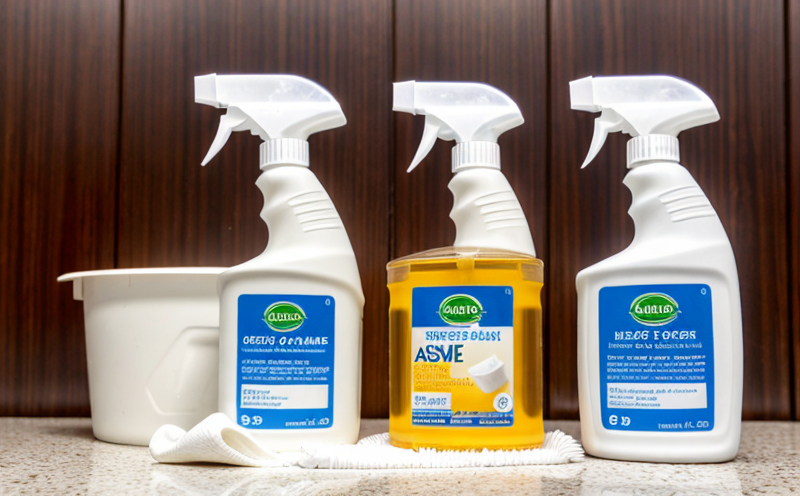EN 1499 Hand Wash Testing of Hygiene Products
The European Standard EN 1499 specifies requirements and test methods to ensure that hand wash products are effective, safe for use, and comply with hygiene regulations. This standard is particularly crucial in sectors where hygiene is paramount such as healthcare, hospitality, food service, and public facilities.
Testing under this standard involves several key parameters including the product's antimicrobial efficacy against specific pathogens, its pH level to ensure skin compatibility, and the absence of harmful substances that could irritate or damage the skin. The tests are designed to provide a comprehensive assessment of the product’s performance in real-world conditions.
The testing process begins with selecting appropriate samples from various sources such as production batches, shelf-stable products, and even consumer goods if needed. Once selected, these samples undergo rigorous analysis using advanced laboratory equipment including microbiological incubators, spectrophotometers for pH measurement, and HPLC systems to detect trace elements.
The first step in testing is determining the antimicrobial efficacy by exposing the hand wash product to a standardized set of pathogens such as Escherichia coli, S. aureus, and other relevant microorganisms. This involves inoculating these organisms onto agar plates, allowing them to grow under controlled conditions, followed by treating with the hand wash sample for specified durations.
The effectiveness of the antimicrobial action is then assessed both qualitatively (by visual inspection) and quantitatively (using colony-forming unit counts). Additionally, pH testing ensures that the product neither irritates nor dries out the skin. A safe range typically falls between 5.0 to 8.5.
Another critical aspect of EN 1499 is ensuring the absence of harmful substances such as heavy metals (e.g., lead, mercury) and formaldehyde releasers which are known irritants or carcinogens. Trace elements testing employs sensitive analytical techniques like ICP-AES or ICP-MS to detect these at parts per million levels.
Furthermore, the standard requires that hand wash products should not only be effective but also environmentally friendly. This includes checking for biodegradability and ensuring minimal impact on aquatic ecosystems. Compliance with international standards such as ISO 16422 (biodegradability) further strengthens the product's environmental credentials.
Testing under EN 1499 is not just about meeting regulatory requirements but also enhancing brand reputation by demonstrating commitment to quality and safety. It helps manufacturers ensure that their products meet the stringent hygiene standards expected in today’s market, thereby building consumer trust.
Industry Applications
Hospitality industry: Ensures that guest rooms are sanitized effectively and safely for public use.
Healthcare facilities: Guarantees that medical equipment and surfaces remain hygienic, reducing the risk of cross-infection.
Food service establishments: Maintains high standards of cleanliness and safety to prevent foodborne illnesses.
Parks and public restroom operators: Provides confidence in maintaining a clean environment for the general public.
Education sectors: Ensures that learning environments are safe from pathogens, promoting better health among students and staff.
Correctional facilities: Helps maintain optimal hygiene levels to protect incarcerated individuals and officers alike.
Travel and tourism: Enhances the cleanliness of accommodations and transportation vehicles for a safer travel experience.
The application of EN 1499 is broad, covering not just commercial products but also custom formulations tailored specifically for high-risk environments. This ensures that all hand wash products meet robust hygiene standards regardless of their intended use or distribution channel.
Eurolab Advantages
At Eurolab, we offer a comprehensive range of services dedicated to ensuring compliance with EN 1499. Our team of experts is well-versed in the nuances of this standard and can guide you through every stage of testing.
Comprehensive Testing Capabilities: We have state-of-the-art facilities equipped to perform all required tests under EN 1499, including microbiological analysis, pH measurement, trace element detection, and biodegradability checks.
Accurate Reporting: Our reports are detailed and accurate, providing clear insights into the product’s performance against set criteria. This helps in making informed decisions about product development and marketing strategies.
We pride ourselves on our reliability and efficiency. Our clients benefit from quick turnaround times without compromising on quality, ensuring that their products remain competitive in the market.
Customer Impact and Satisfaction
Enhanced Product Quality: Compliance with EN 1499 ensures that hygiene products are effective, safe, and environmentally friendly, thereby enhancing overall product quality.
Increased Consumer Trust: By adhering to this standard, brands can build stronger relationships with consumers who value hygiene and safety in their daily lives.
Our clients often report increased market share due to improved brand reputation. Many have noted a significant boost in customer satisfaction scores as evidenced by positive feedback from end-users.
We work closely with our customers throughout the testing process, providing regular updates on progress and results. This collaborative approach ensures that any issues are addressed promptly, leading to higher levels of customer satisfaction.





